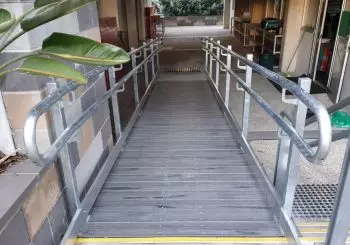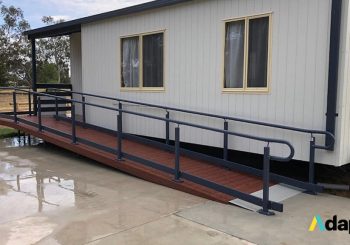Prefabricated wheelchair ramps are pre-made ramps that can be easily installed to provide access to wheelchair users and people with mobility issues. These have modular designs and are available in different materials and sizes, often assembled on-site during installation. This makes them easier and faster to install than traditional custom-made ramps.
In Australia, businesses must comply with accessibility standards to ensure equal access for people with disabilities. Prefabricated wheelchair ramps are a practical solution for businesses to meet these standards as they are part of the national accessibility requirements.
By installing prefab ramps in Australia, businesses can ensure compliance with the accessibility requirements of the following regulating bodies:
1. Disability Discrimination Act (DDA) 1992
The Disability Discrimination Act 1992 prohibits discrimination against people with disabilities in areas such as education, employment, and access to public and commercial places. To ensure accessibility, the DDA requires public establishments such as parks, schools, restaurants, and office and government buildings to have accessibility ramps installed within the premises.
An optimal solution for businesses is to use prefabricated wheelchair ramps in Australia that are designed to meet specific requirements for safe and convenient access for people with disabilities and mobility issues. For more information on the DDA guidelines, please refer to this post.
2. Australian Standards (AS)
The Australian Standards are designed to ensure reliability in the products and services that cater to the public, including safe and accessible commercial spaces. In addition to installing DDA-compliant prefab ramps in Australia, the AS also mandates that accessibility ramps be equipped with non-skid features and elliptical or circular cross-section handrails to enhance safety.
3. Premises Standards
The Premises Standards, also known as the Disability (Access to Premises-Building) Standards 2010, aim to provide people with disabilities with equal access to public buildings and facilities. These standards apply to both new and existing buildings and require businesses to ensure that their premises are accessible and compliant with the DDA.
In addition, compliance with the Premises Standards provides assurance for building certifiers, developers, and managers that their buildings meet the requirements for accessibility and safety for people with disabilities.
4. Accessible Housing
For businesses involved in rental and housing, the majority of Building Ministers in Australia have issued a directive to include minimum accessibility provisions for residential housing and apartments in Queensland, as specified in the National Construction Code (NCC) 2022 based on the Livable Housing Design Guidelines (LHDG) silver standards.
These modern homes aim to increase accessibility standards by including features such as step-free entry, more spacious bathrooms, wider doorways, and provisions for future adaptations such as grab rails in bathrooms and toilets. Before installation, ensure compliance with accessibility standards by thoroughly checking the specifications of prefabricated ramps in Australia. These specifications include the slope, length, and handrails of the ramps.
In addition to meeting accessibility requirements, prefabricated wheelchair ramps also offer several benefits, including quick and easy installation, cost-effectiveness, and versatility. These advantages make them an ideal solution for businesses looking to improve accessibility both for their employees and all customers.
Adapta has over 20 years of experience creating accessibility solutions for businesses in Australia. Contact us today to see how we can help your business.


